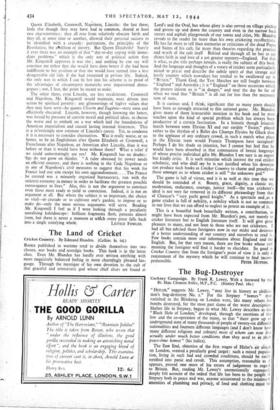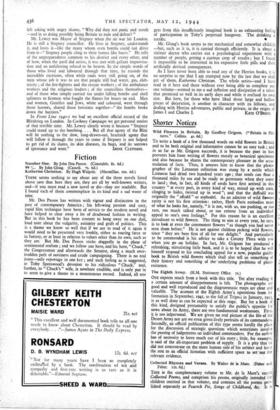The Bug-Destroyer
Cockney Campaign. By Frank R. Lewey, With a foreword by the Rt. Hon. Clement Attlee, M.P., P.C. (Stanley Paul. r6s.) " HrrLEtt,"' suggests Mr. Lewey, "may live in history as civilisa- tion's bug-destroyer No. t." For the Stepney " homes " that vanished in the Blitzkrieg on London were, like many others his bombs destroyed, for the most part slums of the worst description. Shelter life in Stepney, begun in what Mr. Lewey describes as the "Black Hole of London," developed, through the exertions of the few and the co-operation of the many, so that " there grew up an underground state, of many thousands of people of twenty-six different nationalities and fourteen different languages (and I don't know how many different religions and colours) most of whom can now live actually under much better conditions than they used to in their peace-time homes" (his italics).
The East End, objective of the first stages of Hitler's air attack on London, seemed a peculiarly good target: such a mixed popula- tion, living in such bad and crowded conditions, should be easily terrified into panic and. revolt. This assumption, reasonable as it appears, proved one more of his errors of judgement in .regard to Britain. But, reading Mr. Lewey's unemotionally expressed, deeply felt account of the ordeal that life has been to the people of Stepney both in peace and war, anyone accustomed to the minima' amenities of plumbing and privacy, of food and clothing..must be
left asking with angry shame, " Why did they not panic and revolt —and in so doing possibly bring Britain to ruin and defeat? " Mr. Lewey was Mayor of Stepney when the air war hit London. He is still a Stepney councillor. He lives in Stepney, understands it, and loves it—like the many whom even bombs could not drive from it—" Stepney people cling to their homes like burrs." He tells of the unpreparedness common to his district and every other, and of how, when the peril did arrive, it was met with gallant improvisa- tion and an unfaltering refusal to be beaten. In the simple words of those who lived and laboured through that time, he records the incredible exertions, often while raids were still going on, of the men whose job it was to see that people still had water, gas, elec- tricity ; of the fire-fighters and the rescue workers ; of the ambulance workers and the religious leaders ; of the councillors themselves— and of those who simply carried tea under falling bombs and shell splinters to firemen who fought the flames for hours on end. Men and women, Gentiles and Jews, white and coloured, went through those horrors, shared those heroisms together—" the bombs broke down the barriers."
In Front Line 1940-I we had an excellent official record of the Blitzkrieg on London. In Cockney Campaign we get personal stories of that terrible time. Mr. Lewey clearly wrote it because " Stepney could stand up to the bombing. . . . But all that agony of the Blitz will be nothing to the slow, long-drawn-out, heartsick agony that will follow it through the years to come if Stepney is not helped to get rid of its slums, its skin diseases, its bugs, and its sorrows



























 Previous page
Previous page